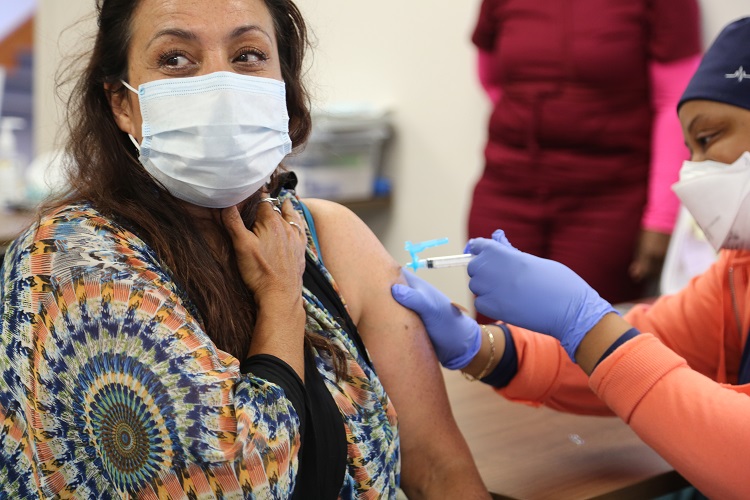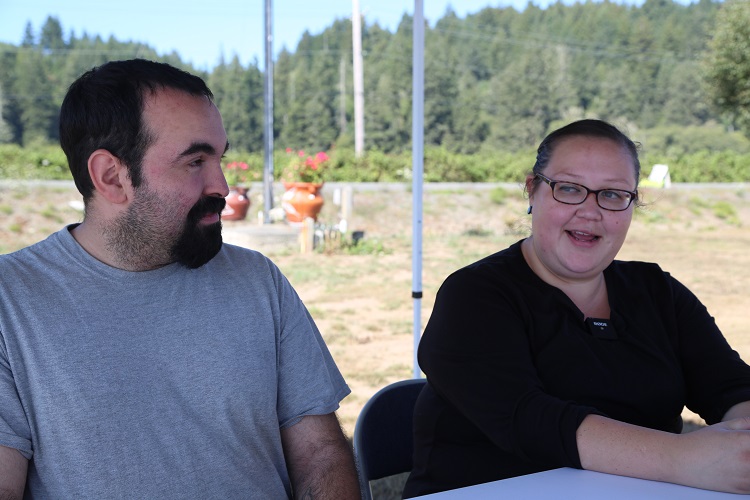By Peter Schurmann, Ethnic Media Services
Photos and video by Manuel Ortiz-Escamez
CRESCENT CITY, Ca. – The last time Daphne Cortese-Lambert saw a doctor was when her daughter was born 27 years ago. The Executive Director of Mission Possible, which provides services to unhoused people in this remote part of California, Cortese-Lambert says she’s long relied on natural remedies to maintain her health.
That changed in early August when the Delta variant of COVID-19 arrived in this region, some 300 miles north of San Francisco, where the number of cases and deaths is climbing even as vaccination rates remain among the lowest in the state.
“As I’ve seen this pandemic come through, I see that I need to be a leader,” said Cortese-Lambert, standing outside the 52-bed women’s shelter she operates in Crescent City. “I don’t want to be a part of the problem because of my own personal beliefs; I want to be part of the solution.”

Sandwiched between sprawling redwood forests and the northern California coast, Del Norte and neighboring Humboldt counties were relatively unscathed during the first year of the pandemic. Case rates were low with deaths linked to the virus in the single digits.
The region’s geographic isolation led many here to feel insulated from the worst impacts of the pandemic, adding to the general distrust around public messaging regarding vaccines and mask wearing.
Then the numbers began to spike, with over 500 new cases reported just in the past two weeks in Del Norte, according to official statistics. The number of fatalities doubled from just 7 during the pandemic’s first year to 15 to date. Vaccination rates have started to climb as a result, going from a low of approximately 20% to 42% currently.
Seeing the effects of the pandemic firsthand on friends and loved ones has begun to chip away at the fear and skepticism that prevented residents like Cortese-Lambert from getting vaccinated, though there is still an uphill battle when it comes to convincing others.
Gesturing toward the forests, she described a near “total lack of concern about the pandemic” among the population she works with, many of them unhoused veterans entrenched in encampments tucked deep in the woods. “They think it’s something the government made up, and that it isn’t going to touch them. But the reality is that it has been touching them.”

The latest Point in Time count puts the unhoused population of Del Norte at 250, but Cortese-Lambert says the figures are likely closer to between 500-600, as many refused to leave their encampments to participate in the official count.
“I miss my older friends,” says one man standing in line at a vaccination drive in the town of McKinleyville, about an hour south of Crescent City in Humboldt County. “At this stage, I don’t think I’m going to get sick, but I could be a carrier and I don’t want to give it to anyone else… that is one of the big points for me to get the shot.”
When it comes to others on the street getting vaccinated, he says most people “don’t want it, and won’t get it.”
According to Cortese-Lambert, trust and relationships are key to reaching this and other communities in a region that like the rest of the state is growing more diverse.
Much of Humboldt and Del Norte counties sit on Native American tribal lands, including the Yurok, Hoopa, Wiyot and Karuk tribes. Alongside these indigenous communities are a sizable Latinx population, which includes a seasonal influx of migrant farmworkers, as well as a small but deeply rooted Hmong population, many of them refugees from the Vietnam era.
That diversity exists within a staunchly conservative and libertarian political culture, making Del Norte one of the reddest parts of California. A Trump 2024 banner hangs alongside Highway 101 as visitors enter Crescent City.
Houawa Moua is president of the Hmong council in Crescent City and a conduit of information for the community, many of whom speak limited English. A father of two, Moua himself is not vaccinated, saying he wants to “wait and see what happens” before deciding, a position he has maintained even with full FDA approval of the Pfizer shot.

But he acknowledges the vaccines have helped safeguard elders and allowed families to get back together, “important to keeping Hmong traditions going among younger generations.”
The importance of protecting elders and continuing tradition – both threatened by covid – is echoed in tribal communities here, many of which sealed themselves off when the pandemic first hit in 2020.
Amber Gensaw, a Yurok Tribal member, recalls it felt like the “first step to the world ending.” Like others in her community, she says the elders are repositories of tribal custom and memory and that it’s critical to ensure their safety. “The elders are the roots,” she says, drawing on trees as a metaphor for the tribe, “while adults are the trunk, and youth are the fruit.”
A diabetic and a new mother, Gensaw got vaccinated in March of this year, soon after vaccines were made available. Her partner, Dustin, did not. When the pair caught Covid in July, she weathered the illness with only minor symptoms. He ended up in bed for six days, struggling to breathe. That experience is what convinced him to get the jab.
Still, the pair say they have friends and family – including Gensaw’s father – who are refusing to get vaccinated, with reasons running the gamut from fear of needles, to distrust of the science, to plain indifference. Countering that reticence, they add, requires patience, persistence, and personal connection.
It’s late afternoon when Cortese-Lambert turns up at the Sutter Coast Hospital’s vaccination clinic for her shot. Joined by her daughter and a volunteer with Mission Possible the trio sits nervously waiting their turn.
Mission Possible just received state funding to set up a mobile unit for the unhoused in the area, including $25 cash incentives for people who agree to sit and listen to information on the pandemic and vaccines. Additional incentives will be offered for those who agree to get the shot.
“I think it’s really important for me to make this stand,” says Cortese-Lambert after receiving her first dose of the vaccine. “I have done a lot of soul searching and I am feeling very positive about taking this step forward.”




